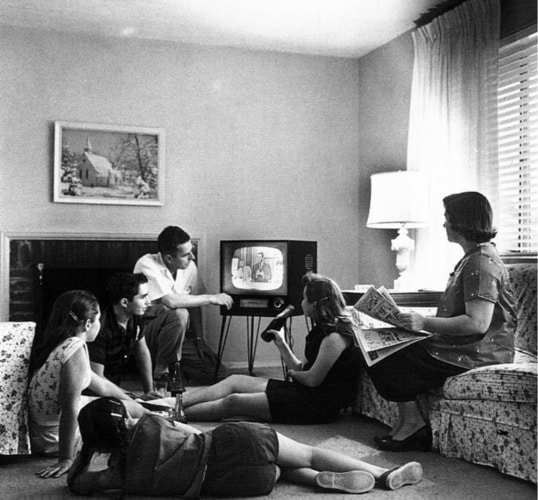Readers of a certain age might well remember the ITV series Game for a Laugh, a 1980s hit featuring variations on the hidden camera prank format that has cursed television for decades now. The show’s sign-off came from its four presenters perched precariously on stools, encouraging viewers to ‘tune in next week when you’ll be watching us, watching you, watching us, watching you.’

I always found it a bit sinister. The thought that Matthew Kelly and Jeremy Beadle might be spying on me from the family TV set wasn’t an enticing one.
It sounded like something Orwell might have dreamed up, and it was: in his masterpiece 1984, Britons lived in state-provided apartments equipped with ‘telescreens’ which were always on, and could relay any (or every) word spoken within range back to anonymous listeners in the employ of Big Brother. Nobody knew when they were being spied upon, or by whom.
It seems that’s no longer fiction. Samsung this week was forced to clarify its privacy policy, after it emerged that the voice recognition feature of its ‘Smart’ TVs , intended to allow users to control certain functions by speaking, could in fact record and relay conversations to unspecified third parties. A similar row brewed last year when Microsoft announced that its Xbox gaming system would also have an ‘always on’ monitoring function, again so that users could switch it on or off by speaking or gesturing. Did this amount to a spy in the living room, users wondered?
Whenever the term Smart crops up, whether it’s for phones, meters, grids, cars or cities, we have to ask the question ‘Why and how is it smart? And for whose benefit?’ If the answer to the second part of the question isn’t ‘The user’, then alarm bells should ring. For example, the smart fitness monitor I sometimes wear on my wrist sends data to my phone and laptop, and I can use software to analyse trends in my hear rate, activity and so on. It doesn’t send anything to my doctor, although it’s conceivable I might sign up to such a service. It certainly doesn’t send anything to a database that insurance companies could access — although the technology exists for it to do so — and the argument that this might benefit me by reducing premiums would be dubious at best.
It’s increasingly in the nature of commercial organisations to collect data on their customers; they usually justify this by saying it helps improve their service. But in many cases we don’t sign up for a ‘service’ when we buy their product. A TV is an appliance used to deliver entertainment services, and the appliance and service are two separate commodities. It seems that the voice recognition functionality has lead Samsung to confuse these issues.
The phrase ‘Caveat emptor’ has been good advice for over two millennia, but it increasingly seems that the advent of the ‘connected world’, or ‘Internet of Things’ as it is sometimes known, has given buyers a much greater range of things to beware of.
After all, on a Friday night I’m quite happy to watch the families who have agreed to appear on Gogglebox commenting on their TVs. But they know when they’re being recorded. I’m not at all happy about appearing on it myself, especially when I don’t know who’s watching or why.











Water Sector Talent Exodus Could Cripple The Sector
Maybe if things are essential for the running of a country and we want to pay a fair price we should be running these utilities on a not for profit...